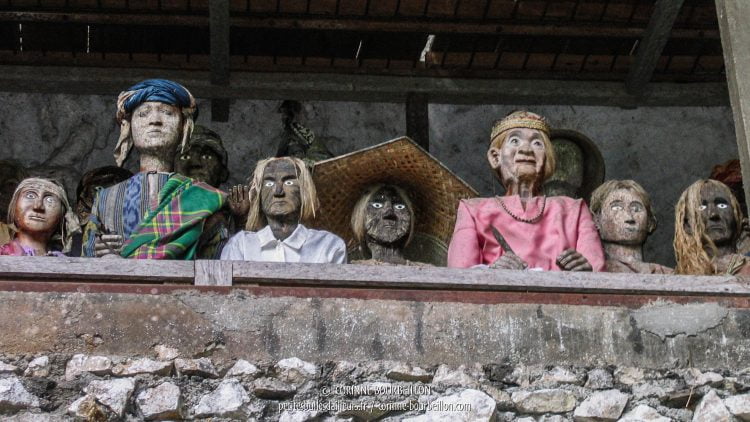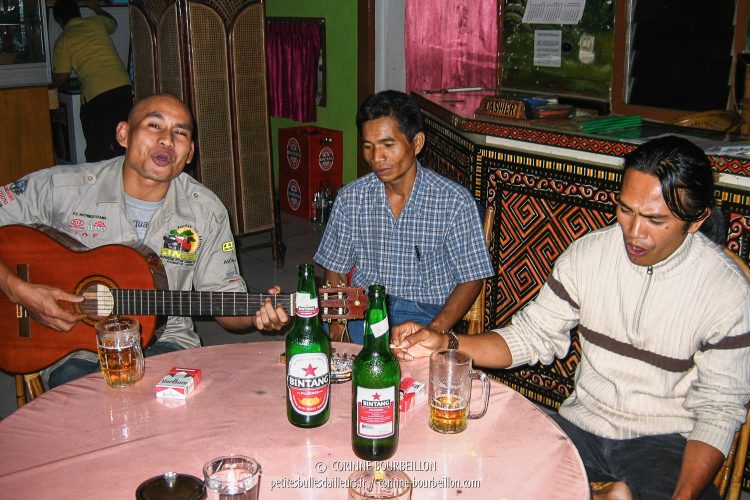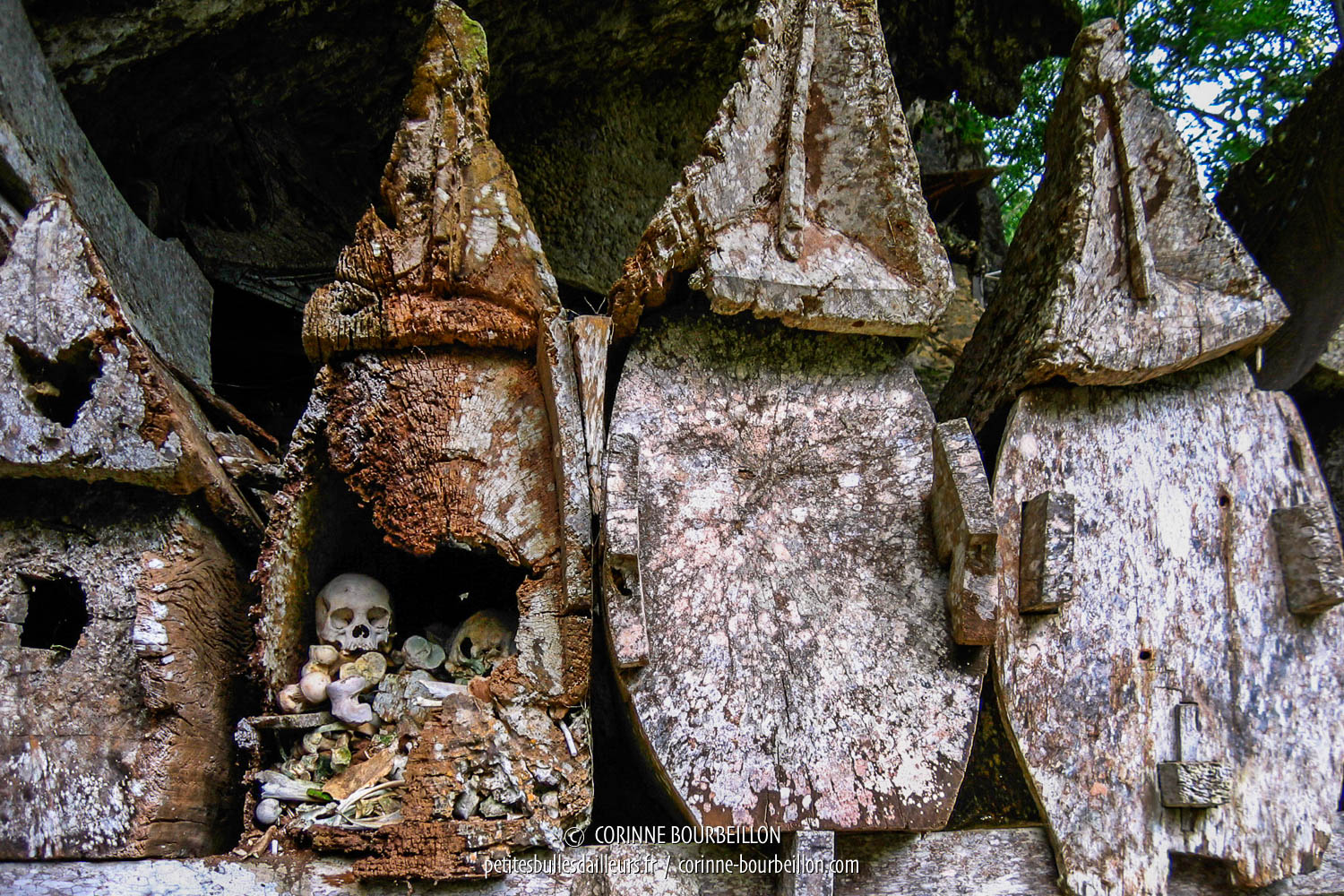Indonesia: Sulawesi - July 2007
Dear English-speaking readers, this page is an automatic translation of an article originally written in French. I apologise for any strange sentences and funny mistakes that may have resulted. If you read French, click on the French flag below to access the original, correct text:
I bring you back to Sulawesi, in the Toraja country, where I spent a few days in summer 2007. The program: scooter ride from Rantepao, to discover the sites of Ket'e Kesu, Londa and Tilanga.
Wisma Monton, my little hotel in Rantepao
Thursday, July 12, 2007, Rantepao. That day, I decided to explore the villages south of the city. So I rented a motorcycle (actually, the equivalent of a scooter), at 40 000 Rp per day (less than 3 €) in the main street. For the location, I got a map of the area at the hotel.
The hotel in question, I landed there on the advice of other travelers I met on the way: it is the Wisma Monton. I recommend the place, it's central and quiet, clean and not expensive, the rooms are large, distributed on balconies around a garden.
Night negotiated at 90 000 Rp (about 6-7 €), with hot water and breakfast included, no surprise extra charge, and charming welcome. Below, the interior of Wisma Monton and the view from the hotel balconies.
I leave on my motorcycle with a light heart, the nose to the wind, without fear. The "motorcycles", as everywhere in Southeast Asia, are in fact mopeds-scooters with left foot gear change. You don't need to be a biker to ride these machines.
Once crossed the limits of Rantepao, the roads and paths are very quiet. Just roll at a low speed, keeping your thumb on the horn and an eye on dogs, chickens, children crossing ...
Ket'e Kesu: traditional rice granaries and hanging tombs
First stage, well known from the local tourist circuits: Ket'e Kesu. I am there early in the morning, there is not a cat. And the light is beautiful.
There are pretty traditional houses and rice granaries tongkonan, tau-tau (the statues of the deceased) locked behind a gate, recent graves and ancient tombs suspended, with gnawed wood and bones scattered at the foot of the cliff behind the village.


Peaceful atmosphere, again, as in Lemo. Curiously, the proximity of death does not frighten, in these regions, but rather inspires serenity.
Londa: Toraja and Londa cave tombs and tau-tau
Then head for Londa, another famous burial site. Here too, tau-tau watch for visitors from a balcony. But most people come to Londa for the "Caves"Caves full of skulls. Not very disgusting. Offerings" in cigarettes, money, candies are left in bulk near the bones.




I also ventured into the tiny wet tube connecting the two main caves, led by a guide who rents his services at the entrance with a powerful lamp. The lamp is essential, but the cave is not interesting. It just allowed me to check that I have a good resistance to claustrophobia... The two caves are in fact accessible from the outside.
The site, outside, is beautiful. Steep scenery of cliffs surrounding a rice field. I give the few rupees promised to the guy with his lamp, then go back to my bike.
Swimming at the natural swimming pool of Tilanga
Direction the natural pool of Tilanga. The walk from one site to another is very pleasant. We pass by little frequented country roads, where people greet you cheerfully, we go along rice fields, fields, pieces of forests.

Tilanga is a kind of basin in the rock. The water is very cold, very clear. We are under the cover of trees, it is good. It is a place where young people, families of the area, meet during the vacations or the weekend.
I had barely arrived when a group of young girls spotted me and waved at me. I join them while trying not to break my face on the irregular rocks which border the water. Boys of the same age, a little further, observe me approaching.


I'm making friends at the pool. Uny, 21 years old, who studies English to become a teacher, is happy to make conversation with me. She is there with Veronika and Lina, I don't know which of them is her cousin, and a whole flock of kids and teenagers of various ages, brothers and sisters of the ones and the others... We chat, we sympathize, obligatory photos and exchange email addresses.
The group of boys passes in front of us, calls out to the girls in a slightly mocking tone, and walks away along the path. Some of them dare to wave goodbye to me, others turn their heads away shyly when I meet their eyes.

I will catch up with them a little further on the road, with my motorcycle. They walk all the way back to the first stop of bemos (local minibuses). I stop at their height and do a little chat.
I begin by responding to their "Dari mana?" (where are you from?) and the usual questions with the little Bahasa Indonesia that I know, but the rest is in English. They are doing well. They are amazed to see a tourist, a girl moreover, walking around like that, without a guide or chaperone, and on a motorcycle. But they think I'm right.
We leave with great joyful greetings and I take the path of Rantepao.
Back to Rantepao
Before returning, I push by curiosity until the market of Bolunear Rantepao, where I offer myself a mie goreng (sauteed noodles) quite average, too fat, in a boui-boui. Another market where we sell everything and lots of odorous foods more or less identifiable.
AT RantepaoI meet my Dutch friends, Suzanna and Johan, who want to rent a car with driver the day after tomorrow, to go up to the Poso lake. They offer me to share the car with them. They are looking for a "family" model, comfortable, with air-conditioning, for their three children: two girls, Ronja and Silke, and a boy, Jelle (the J's in Dutch names are pronounced Y). There will be room. I am tempted to go for a ride and I gladly accept.

So I decided to change my plans. At first, I thought I would save myself fatigue and worries by going back down south to Makassar, to take a flight to Luwuk. And Luwuk, win Ampana by road, from where we embark for the Togian Islands. Instead, I will travel by the inner road.
I am really happy with Suzanna and Johan's offer, because I wanted to do this trip, but I was hesitant to do it alone. The region of Poso lake was known to be unsafe for solo travelers according to the travel guides I had consulted (this is apparently very exaggerated, the situation has since calmed down). Renting a car with a driver for myself was not in my budget. And I didn't feel brave enough to take an endless and uncomfortable ride in a local bus without air conditioning on bad roads.
I manage somehow to cancel my Makassar-Luwuk flight on the Merpati, booked a few days earlier to Manado. The people from the travel agency Toraja Permai, at RantepaoThey are very nice, very helpful, in the main street (jalan Mapanyukki). They make all the phone calls for me, settle my story. The refund of the ticket will be to recover, reduced of some expenses, in the agency where I bought it in Manado.
The Mambo, haunt of local guides
I'm going to dinner at the restaurant Mambo, along with my other roommate neighbors at Wisma MontonI met a Spanish couple, Joseba and Anna, with whom I got on well. The Mambo is the haunt of local guides and we're having a good time listening to them singing, in all languages, to distract the handful of tourists seated there.
They are very nice, all these guys, incredibly multilingual. The Guide to the Routard criticizes their aggressive behavior, but I have not observed any such thing.
On the contrary. They tell us a lot of interesting things, they are funny, open. And dismayed to learn that we prefer to visit the country without them. But as we buy them a few beers to console them, they don't hold it against us. We drink, we laugh.

Anyway, they already have customers this week. Groups on tour are in Rantepao for a few days. Among them, many French.
The next day we are planning, Joseba, Ana and I, to go on a motorcycle ride together in the North, around Batutumonga.







